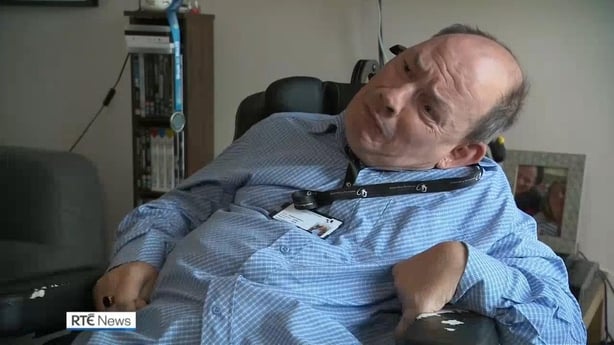Talks are continuing at the Workplace Relations Commission this evening in a bid to avert a strike tomorrow by health and social care workers in the community and voluntary sector.
Unions and Government representatives were invited to attend the negotiations which began this afternoon.
The indefinite strike action was announced last month, and if it goes ahead tomorrow, it will involve around 5,000 community and voluntary sector workers across 18 different charities and agencies around the country.
The organisations that will be impacted include Enable Ireland, the Irish Wheelchair Association and family resource centres.
Unions say that health and social care professionals employed in agencies funded by the Health Service Executive (HSE) are paid significantly less than equivalent workers employed directly by the HSE and other state bodies.
Arriving for today's talks, Liam Berney, Industrial Officer with the Irish Congress of Trade Unions said they hoped that the Government side would come to the table with a set of proposals that they can put to their members.
"We have been at this process for several months and we have had several false dawns.
"We are concentrating on trying to find a solution and also concentrating on making sure that if we do have to strike tomorrow, that it will be effective."
"I think we are cautious but we will work hard to get a solution if the other side is in the same frame of mind," he added.
An offer from the Government of a 5% increase in funding for pay was previously rejected by unions.
The Department of Health said that while the organisations impacted by the dispute receive state funding, they are privately owned and the Government is not the employer.
"Any industrial action will impact negatively on service users and the Government urges all parties to work on resolving any disputes through the appropriate forums, in the interests of users of these services," the Department said in a statement.
Enable Ireland warned today that if the strike goes ahead tomorrow it will lead to substantial disruption including the closure of many services.
"For many years, Enable Ireland has advocated for a return to pay parity and alignment for our staff and we fully support staff demands for equal pay with HSE and Section 38 staff," the organisation said in a statement.
"While we support the requested pay increase, we are not in a position to fund it directly," it added.
"I am worried I won't be able to get to work" - service users anxious ahead of strike action

Dermot Purcell went back to work today after three-and-a-half years.
He relies on the help of the Irish Wheelchair Association and is worried that he won't be able to get to work this week if his personal assistant (PA) is on strike.
Mr Purcell said: "The PA service is essential for me; I need a lot of physical support.
"I am worried about the strike and if it escalates I don't know how I am going to make it into work.
"I explained the situation to my employers and they said that it was fine, but I only started a new job today and it will upset things very much if I can't go in to work."
The Irish Wheelchair Association (IWA) said tomorrow's strike will have a profound impact on the lives of people with disabilities.
"We are calling on the Government to do everything in their power to prevent this unnecessary strike," the association said in a statement.
It added: "IWA understands that the decision to undertake strike action was not taken lightly by our employees and all workers in Section 39 organisations.
"IWA supports the call for a fair and equitable system of payment – that our employees are brought back in line with payment of their HSE equivalent."
The IWA is one of 18 organisations that will be impacted by indefinite strike action.
Around 5,000 health and social care workers in the community and voluntary sector are taking the action in a dispute over pay.
Unions say they earn significantly less than equivalent staff employed directly by the HSE.
Talks are continuing at the WRC this evening in a bid to avert the strike.
An offer from the Government of a 5% increase in funding for pay earlier this year was rejected by unions.
The Department of Health has said that while the organisations impacted by this dispute receive state funding, they are privately owned and the Government is not the employer.







